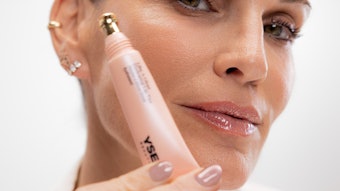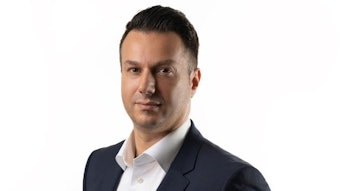On any given day, founder and creative director of The Beauty Company (TBC) Alisa Marie Beyer has a lot on her calendar. From a call with formulators and product developers to a design strategy session with her creative team to karate practice with her youngest son, this busy entrepreneur’s life is anything but typical. For the past four years, I’ve had the pleasure of working with this dedicated entrepreneur on a day-to-day basis and witnessing first-hand the strategy behind the business she drives—namely, beauty.
Honed from her experience in the worlds of PR and fashion—her life before starting The Beauty Company—Beyer has a unique perspective on starting and building beauty companies that allows her to take good ideas and make them extraordinary. It is with this unique perspective that Beyer is now taking some of her own advice and turning her attention to the creation of her own brand: Coastal Salt & Soul, a line of vintage fragrance, body, bath and home products inspired by Beyer’s lifelong love of the seaside.
Now, after countless hours working with numerous beauty entrepreneurs all hoping to toss their hat into the crowded beauty ring, and deep in the process of starting her next new business, we thought it was an interesting opportunity to get Beyer’s perspective on how a business can win in the beauty arena.
As she likes to say, “People come to TBC with one of two things: a dream or a dream that is broken,” and this isn’t necessarily always a fifty-fifty proposition. Sadly, we’ve seen our fair share of businesses fail. As a creative writer and avowed beauty dreamer, there’s nothing I like less than seeing the twinkle fade out of another creative dreamer’s eye, which is why hopefully, with Beyer’s perspective on navigating this tricky landscape, every dreamer out there will have a better idea on what it really takes to succeed as a business in the big, bold, beautiful world of beauty.
Martha Kepner: Strategically, what is the most important decision a new beauty business needs to make before they get started?
Alisa Marie Beyer: A strong vision. To build a business from scratch, you need to know what the heck it is you’re building.
That sounds simple, but it’s not really simple at all. I’ve seen entrepreneurs without a strong point of view on what the vision is for their company, and I’ve seen entrepreneurs with a razor-sharp focus. The best know exactly what they want, they know what they need to do to achieve their vision, and they know what they need to do to get there.
They also are super at mapping out a system of how they are going to reach their goals. At my company, I have a system called a Work Plan, (much dreaded words for my staff!), and I’m a stickler for planning the work and working the plan 24-7-365.
MK: What do the most successful new businesses do well?
AMB: You need to believe in your vision for the business, and you must empower everyone on your team to believe as well.
True entrepreneurs don’t question their ability to succeed or whether they are worthy of success. They are always confident with the knowledge that they can make their business succeed and that they have the vision, dedication and determination to get over every hurdle that is part of the start-up process and to succeed. This confidence gives the team a sense of strength as well.
MK: What is the biggest mistake often made by business owners?
AMB: This one is so clear to me since it’s my biggest issue as well—focus and discipline.
I believe entrepreneurs start companies because we are good at coming up with ideas, and we sometimes fall in love with the idea of new ideas. While they all might be really good ideas, we simply can’t execute on them all, and we end up in a weird Ping-Pong scenario—bouncing from one idea to the next, using up resources while nothing is actually getting done or moving forward. (Translation: Lost revenues and increased expenses—nobody likes that!) Getting stuck in the idea phase of being an entrepreneur burns through time, energy and money, and often, nothing gets done because the focus shifts, yet again.
My team has a signal for when I’m doing this—it’s the word “mangos.” If I get off the path and start running around talking about idea after idea and not focusing on the business at hand (i.e., picking mangos), someone will discreetly cough, “Mangos”…which makes us all laugh and I get back on track.
On a larger scale, I also have found that identifying and writing down my five key areas of focus helps me stay on target. I keep an idea journal, where I write down all my other ideas and promise to not act on them for four weeks, which often leads me to realize a week later that the mango I was chasing after is not as ripe as I thought.
MK: What are the most important intangible success factors you think an entrepreneur needs?
AMB: A ton of courage. You have to have the guts to beat the odds, and often that means pulling on an internal strength you maybe didn’t know you possessed, both for you and your team. Obviously, we all have our own fears and are afraid to fail, but a strong dose of courage is what allows us to just take action regardless of the possibility of negative outcomes.
I remember before I started my first company, I asked one of my favorite business mentors, Jamie MacVicar, what he felt was necessary for success in business. He said three simple things:
- Cash is king.
- Work like a dog.
- Take vacations.
Great entrepreneurs don’t overanalyze situations or spend too much time thinking about the consequences. They just take action, watch their cash, work hard and then take time to enjoy their labors.
MK: How important is being a self-starter to a successful business launch?
AMB: From the time I started my very first company, I’ve always remembered and understood one key thing: if there was a detail I felt was critical to the success of the business and needed to be done, I did it myself. Yes, surrounding yourself with a great team is important, but as the business owner and leader, you can’t rely on your staff or your consultants to truly drive your business at the critical path points. Only you can do that. You can’t sit around waiting for opportunities to come knocking—you need to beat the door down yourself.
MK: How do you recover from a business setback?
AMB: Order a martini.
Seriously though, I’ve had plenty of them, and if I’m being truthful, not one of them was ever fun. Like most entrepreneurs, I’m not good at failing, so I make sure I’ve got some go-to remedies to help me recover from the setbacks we all experience. I talk to my husband, which always helps me feel better about the situation, and I give myself one day of self pity, and then I get back up, make the needed adjustments and move on.
I’m not a big fan of dwelling on what didn’t work, so once I’ve had my moment, I am up and on to the next thing. It’s why I keep a notebook full of mangos.
MK: What do you do in your spare time (if you ever have any)?
AMB: Don’t tell anyone, but I actually have a lot of free time. A little secret no one ever tells you is that with each business you start, it actually does get easier. And in this case, aging actually helps.
I’m not just an entrepreneur and business owner—I have three very active kids, two dogs and a husband. We spend a ton of time together doing fun and silly things, and for me, these are the best times of my life.
MK: If you could give new beauty entrepreneurs one piece of advice, what would it be?
AMB: The facts matter. Get a good lawyer—a really good lawyer—and then listen when they give advice. Contracts matter. Details matter. Pay these people to double and triple check your business matters, and then pay attention if they tell you things aren’t quite right.
I’ve seen more than one smart business owner waste millions of dollars on creating brands and products, down to finished goods and websites, only to find out they don’t own the trademark to the brand or the company’s URL. These are all details that should never have been overlooked, and taking the time to uncover all of these small details makes a huge difference.
Making a Go of It
Already well down the road of building her next new business, I’ve always found it inspiring that Beyer still takes her own advice seriously and knows that, even for someone with her experience and knowledge of the inner workings of the industry, success is never a guarantee.
Carving out a new space is incredibly hard. However, by following her own rules (and every so often breaking a few), Beyer has been able to help create award-winning businesses for entrepreneurs who share her drive, passion, commitment and zeal for taking beauty to the next level, product by product.
As the director of creative writing and brand strategy at The Beauty Company, Martha Kepner directly oversees the development and creation of all creative and brand strategy activities—including concept-to-launch brand identity, positioning and marketing campaigns for the agency’s clients. With more than 20 years of experience in the beauty industry, she brings her in-depth knowledge of both products and brands to her position in order to build highly differentiated, compelling, must-have businesses.










